牛津译林版9下Unit 3 Robot Reading课件 (共30张PPT)
文档属性
| 名称 | 牛津译林版9下Unit 3 Robot Reading课件 (共30张PPT) | 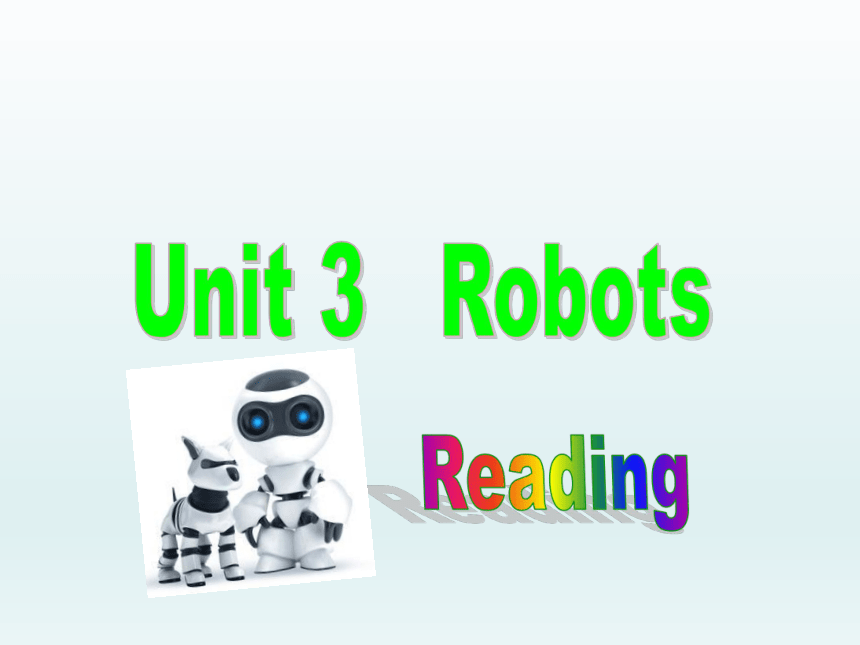 | |
| 格式 | zip | ||
| 文件大小 | 3.6MB | ||
| 资源类型 | 教案 | ||
| 版本资源 | 牛津译林版 | ||
| 科目 | 英语 | ||
| 更新时间 | 2019-01-21 21:52:02 | ||
图片预览

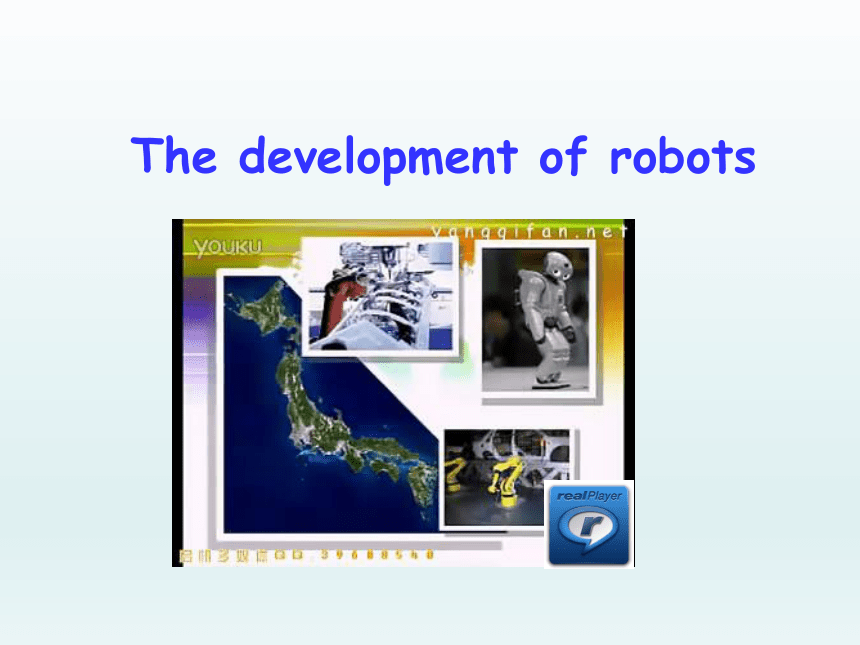

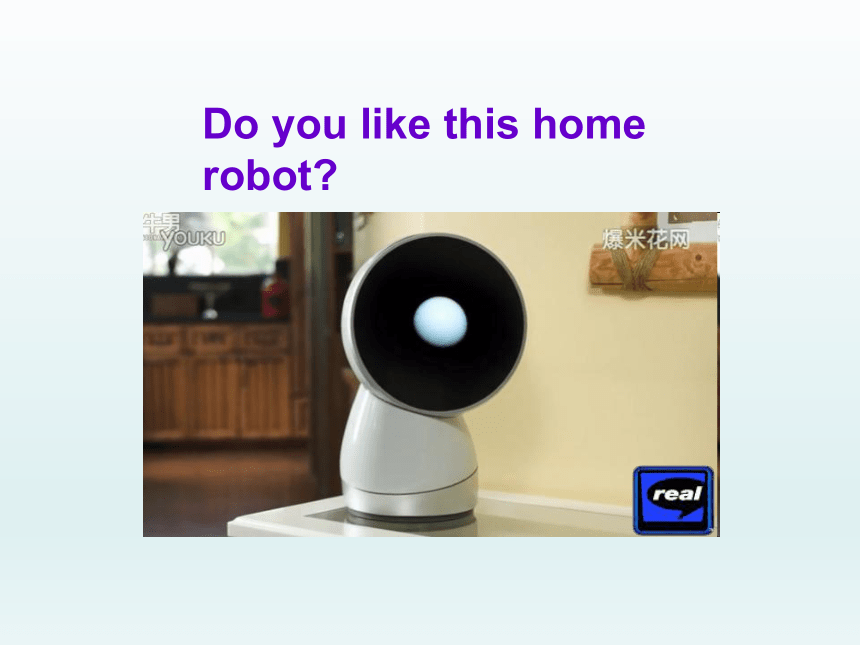
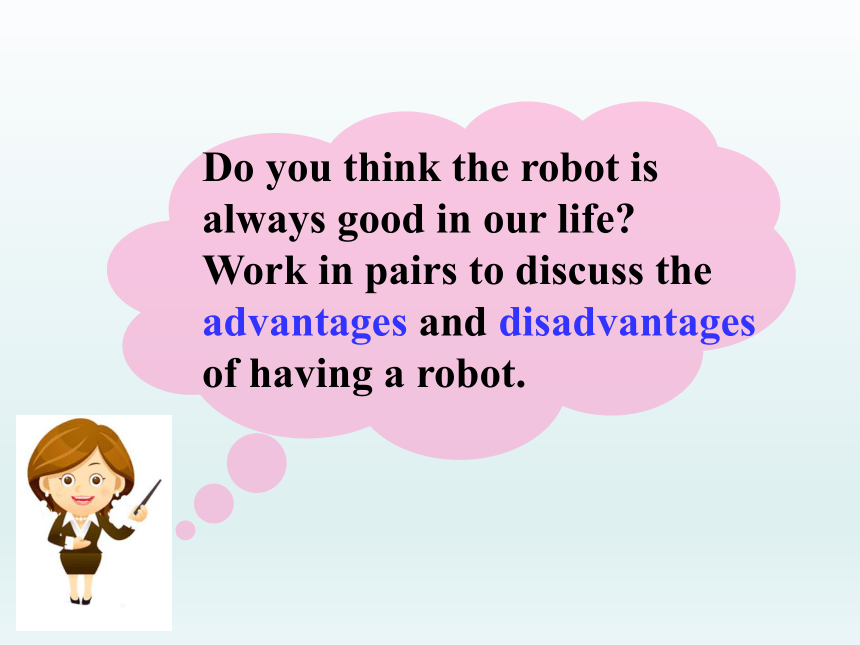
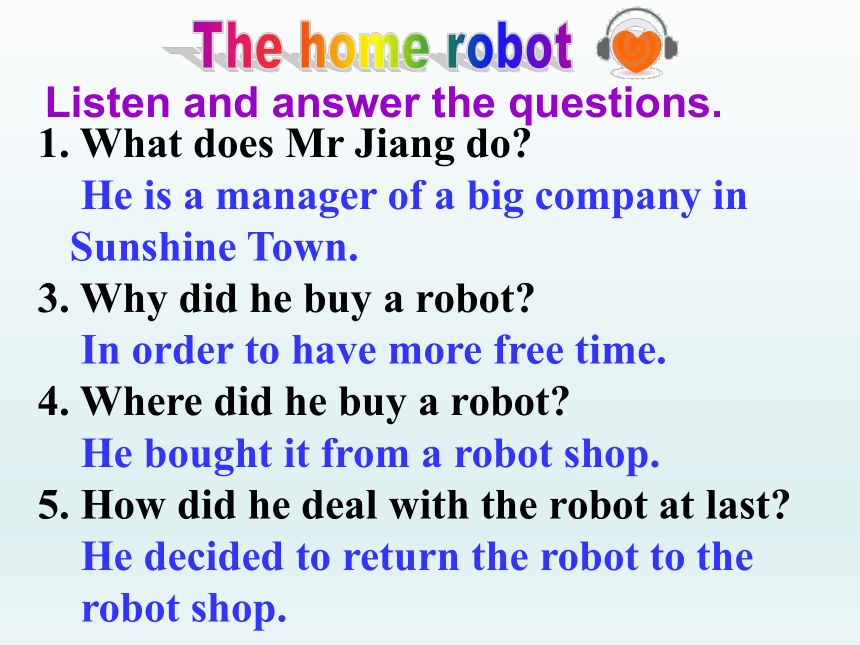
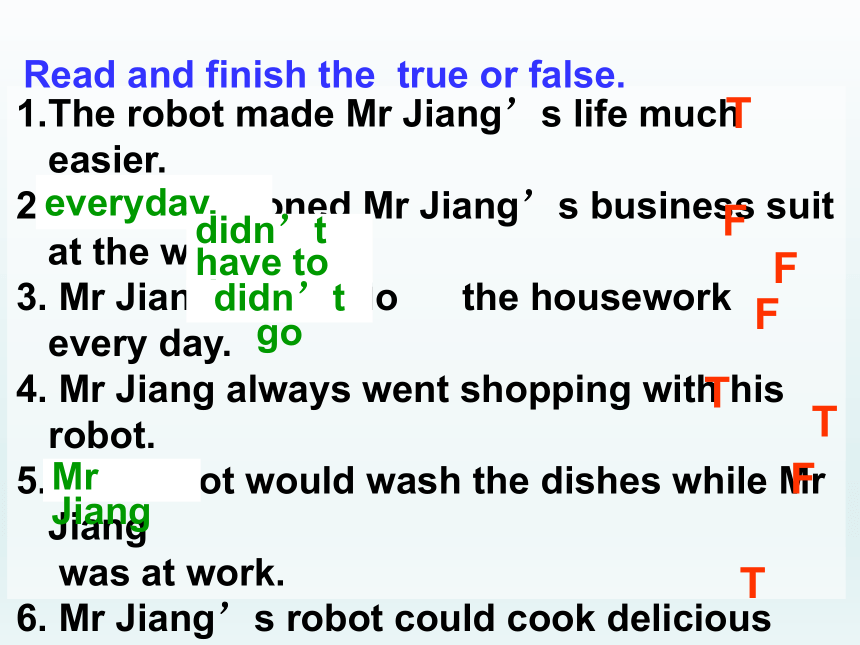
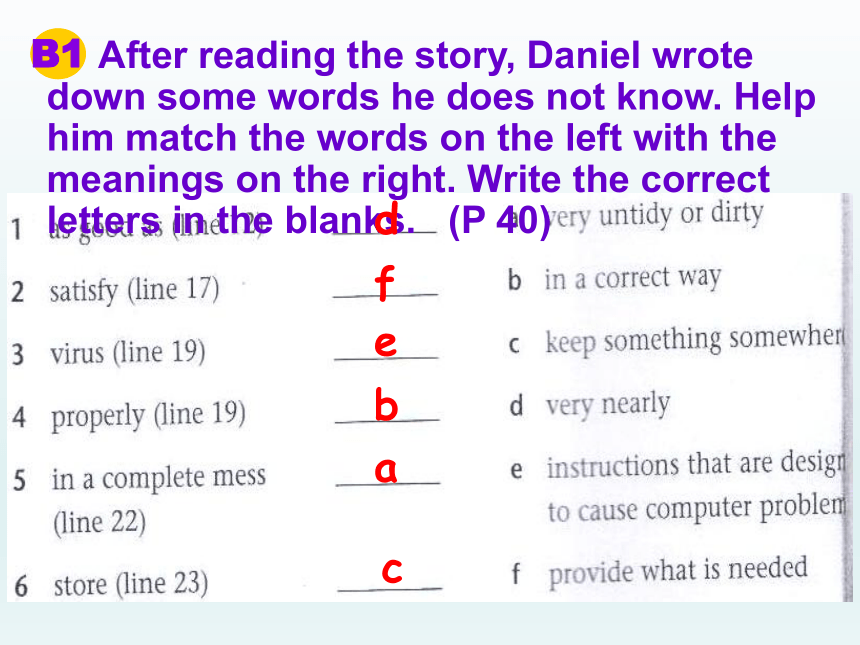

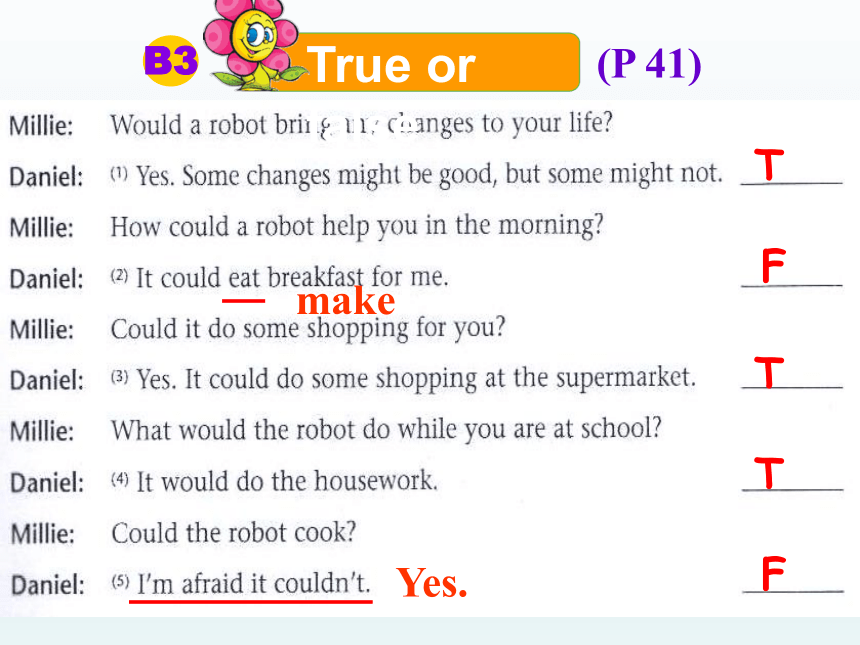
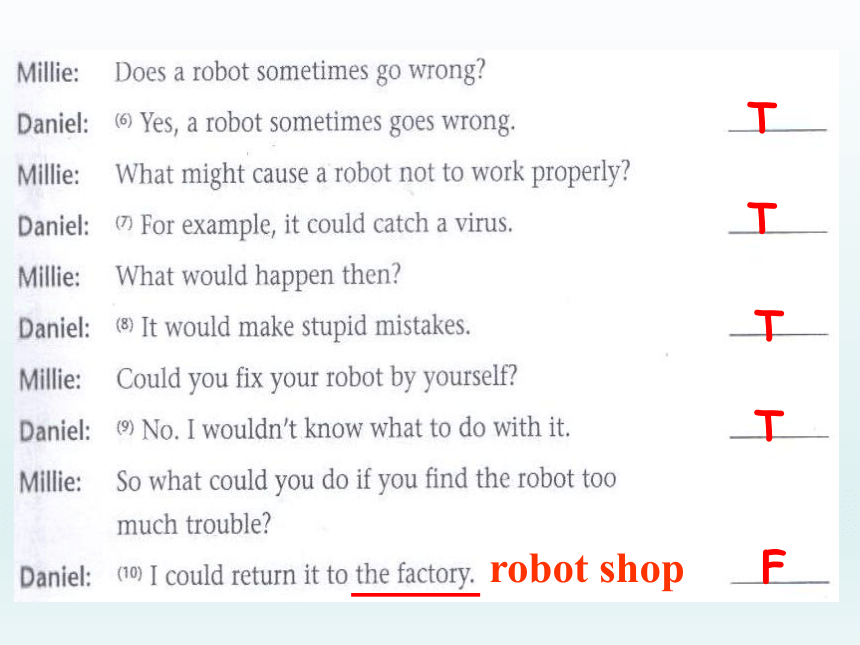

文档简介
课件30张PPT。ReadingUnit 3 RobotsThe development of robotsDo you want to have a kind of home robot?
Which one do you need most?Do you like this home robot?Do you think the robot is always good in our life?
Work in pairs to discuss the advantages and disadvantages of having a robot. The home robot Listen and answer the questions. What does Mr Jiang do?
He is a manager of a big company in Sunshine Town.
3. Why did he buy a robot?
In order to have more free time.
4. Where did he buy a robot?
He bought it from a robot shop.
5. How did he deal with the robot at last?
He decided to return the robot to the
robot shop.The robot made Mr Jiang’s life much easier.
The robot ironed Mr Jiang’s business suit
at the weekend.
3. Mr Jiang had to do the housework every day.
4. Mr Jiang always went shopping with his robot.
5. The robot would wash the dishes while Mr Jiang
was at work.
6. Mr Jiang’s robot could cook delicious dinner for him.
7. The robot could relax and watch TV after dinner.
8. Mr Jiang was very happy to have a robot in the
beginning.TFFFRead and finish the true or false.TTFTeveryday.didn’t have to dodidn’t goMr Jiang After reading the story, Daniel wrote down some words he does not know. Help him match the words on the left with the meanings on the right. Write the correct letters in the blanks. (P 40)B1d f e b a c relaxbreakfastirongo shoppingtidy upas good as newa viruswake me upbedrubbish binprivate papersknock things over. Daniel is thinking of the good and bad points of having a robot. Help him complete the lists below using the information in the story on pages 38 and 39. (P 40)B2B3(P 41)T F T T F makeYes.T T T T F robot shopTeam racingActivityWork in groups to have a debate:
Is it good or bad for us to have a robot?Ready?Useful expressions
Talking about the advantages of robots
Robots are good because …
Robots can help us …
Some things that robots can do but we can’t are …
I’d like to own a robot because …Useful expressions
Talking about the disadvantages of robots
Robots aren’t good because …
Robots can’t do everything right because …
I wouldn’t like to own a robot because …Advantages of having a robot:
can do housework for us
can let us have more free time
can clean the rooms
can make the bed
can go shopping at the supermarket
can iron our shirts
can do the laundry
…Disadvantages of having a robot:
might be easy to catch a virus
might forget to cook breakfast
might cause a lot of problems
might wake us up too early
might put our breakfast and clean
shirts in the wrong place
might move around the house and
knock things over
might make our flats a mess
…句中satisfy是动词,意为“满足(需求、需要)”。
be satisfied with 对……感到满意(满足)这只大蛋糕不足以让他解饿。
The big cake was not enough to satisfy his hunger.
丹尼尔对他的机器人一点都不满意。
Daniel is not satisfied with his robot at all.1. It seemed that in general the robot satisfied Mr Jiang’s needs.Language pointsbe ready for 为…准备好
= be ready to do … 他已经准备好英语考试了。
He is ready for the English exam.
=He is ready to have the English exam.2. …and a delicious dinner would be ready for him.3. After a few comfortable weeks, however,
things started to go wrong.他们搬家住到市中心后,问题就开始出现了。
Things started to go wrong after they
moved house to live in the city centre.
钟出毛病了。
Something has gone wrong with the clock.go wrong 出现问题
go wrong 用于描述机器时,可表示机器“发生故障,出毛病”句中的mess是可数名词,常用单数形
式,意思是“杂乱,不整齐”。
常见的搭配有be in a mess(杂乱不堪),
make a mess (搞得一塌糊涂)。
spread 意为“使分散,使分布”。聚会过后房子一定会乱七八糟。
A house is bound to be in a mess after a party.
种子通常随风传播。
Seeds are often spread by the wind.4. When Mr Jiang got home, he would find his flat in a complete mess; food was laid on the bed; …bills and his private papers were spread all over the floor.5. Mr Jiang did not know what to do with
the robot.男孩们不知道放学后该做些什么。
The boys didn't know what to do with
themselves after school ended.
我与这事没有牵连; 它与我无关。
I am not involved in it; it has nothing to
do with me.do with 处置, 对待, 对付(某人)
do with 也可表示“与…有关”Let the word flyGuess the meanings of “spread”:
Who spread these rumours (留言)?
Let’s spread the map out on the floor.
Can you spread the bread with butter?
Its branches spread far and wide.v. 传播;散播,散布v. 伸开,展开,铺开v. 涂,抹,敷v. 绵延,扩展将下列英语翻译成汉语。
1. The salesman has spread out his
goods on the floor.
2. The word spread that Lisa had
resigned (辞职).
3. The Moors (摩尔人) spread all over
Southern Spain.
4. If you warm up the butter it’ll spread
more easily.
5. The work will be spread across the
department.售货员已经把他的货物摊在地板上了。有消息传说丽莎已经辞职了。
摩尔人遍布西班牙南部地区。
如果你把黄油加热一下,就比较容易涂了。这项工作将在各部门之间分摊。
请点击Word图标I. 根据提示完成句子。
Mr. Jiang’s shirts are ______ (熨烫) by
the robot every day.
2. Tom, don’t ______ (cover a large area) coins everywhere. Put them away.
3. His robot can _________ (不再) work.
Things started to _________ (变坏).
4. The robot caught a _____ (病毒) and
threw his shirt into the rubbish bin.
5. My room is in a _____ (混乱). Can you
help me make it clean and tidy?ironedspreadno longergo wrongvirusmessThe first real robot for childrenII. 根据短文回答问题。The Bossa Nova Penbo Interactive (互动的) Penguin Robot is a lovable interactive penguin that loves you and loves her baby. Penbo is the first real robot for children. It is a clever doll that loves to talk and play. Penbo replies to touch and sound and speaks Penguish. Penbo calls and interacts with her baby and rocks her baby to sleep. The baby can play games with Penbo including hide-and-seek and peek-a-boo. The baby works as the remote control for Penbo, which makes her walk, turn and flap (拍动) wings. The Bossa Nova Penbo Interactive Penguin Robot is made up of Penbo robot, a baby and an egg. She is the happiest when you give her lots of love and care. She listens, talks, responds to (对……作出反应) you and to her Bebe, and reacts when you pet her head or carry her with you. Play with Bebe and Penbo by holding Bebe in front of Mummy’s heart and pressing on Bebe’s head.Fill in the blanks.
The robot is made up of Penbo robot,
a baby and an _________.
2. The underlined word ‘pet’ means ‘_______’ in Chinese.egg抚摸Homework1. Learn the new words and phrases
by heart after class.
2. Read the articles in page 1 of
Learning English. The more you read,
the faster and better you’ll understand.
3. Preview Grammar on page 42-44.
Which one do you need most?Do you like this home robot?Do you think the robot is always good in our life?
Work in pairs to discuss the advantages and disadvantages of having a robot. The home robot Listen and answer the questions. What does Mr Jiang do?
He is a manager of a big company in Sunshine Town.
3. Why did he buy a robot?
In order to have more free time.
4. Where did he buy a robot?
He bought it from a robot shop.
5. How did he deal with the robot at last?
He decided to return the robot to the
robot shop.The robot made Mr Jiang’s life much easier.
The robot ironed Mr Jiang’s business suit
at the weekend.
3. Mr Jiang had to do the housework every day.
4. Mr Jiang always went shopping with his robot.
5. The robot would wash the dishes while Mr Jiang
was at work.
6. Mr Jiang’s robot could cook delicious dinner for him.
7. The robot could relax and watch TV after dinner.
8. Mr Jiang was very happy to have a robot in the
beginning.TFFFRead and finish the true or false.TTFTeveryday.didn’t have to dodidn’t goMr Jiang After reading the story, Daniel wrote down some words he does not know. Help him match the words on the left with the meanings on the right. Write the correct letters in the blanks. (P 40)B1d f e b a c relaxbreakfastirongo shoppingtidy upas good as newa viruswake me upbedrubbish binprivate papersknock things over. Daniel is thinking of the good and bad points of having a robot. Help him complete the lists below using the information in the story on pages 38 and 39. (P 40)B2B3(P 41)T F T T F makeYes.T T T T F robot shopTeam racingActivityWork in groups to have a debate:
Is it good or bad for us to have a robot?Ready?Useful expressions
Talking about the advantages of robots
Robots are good because …
Robots can help us …
Some things that robots can do but we can’t are …
I’d like to own a robot because …Useful expressions
Talking about the disadvantages of robots
Robots aren’t good because …
Robots can’t do everything right because …
I wouldn’t like to own a robot because …Advantages of having a robot:
can do housework for us
can let us have more free time
can clean the rooms
can make the bed
can go shopping at the supermarket
can iron our shirts
can do the laundry
…Disadvantages of having a robot:
might be easy to catch a virus
might forget to cook breakfast
might cause a lot of problems
might wake us up too early
might put our breakfast and clean
shirts in the wrong place
might move around the house and
knock things over
might make our flats a mess
…句中satisfy是动词,意为“满足(需求、需要)”。
be satisfied with 对……感到满意(满足)这只大蛋糕不足以让他解饿。
The big cake was not enough to satisfy his hunger.
丹尼尔对他的机器人一点都不满意。
Daniel is not satisfied with his robot at all.1. It seemed that in general the robot satisfied Mr Jiang’s needs.Language pointsbe ready for 为…准备好
= be ready to do … 他已经准备好英语考试了。
He is ready for the English exam.
=He is ready to have the English exam.2. …and a delicious dinner would be ready for him.3. After a few comfortable weeks, however,
things started to go wrong.他们搬家住到市中心后,问题就开始出现了。
Things started to go wrong after they
moved house to live in the city centre.
钟出毛病了。
Something has gone wrong with the clock.go wrong 出现问题
go wrong 用于描述机器时,可表示机器“发生故障,出毛病”句中的mess是可数名词,常用单数形
式,意思是“杂乱,不整齐”。
常见的搭配有be in a mess(杂乱不堪),
make a mess (搞得一塌糊涂)。
spread 意为“使分散,使分布”。聚会过后房子一定会乱七八糟。
A house is bound to be in a mess after a party.
种子通常随风传播。
Seeds are often spread by the wind.4. When Mr Jiang got home, he would find his flat in a complete mess; food was laid on the bed; …bills and his private papers were spread all over the floor.5. Mr Jiang did not know what to do with
the robot.男孩们不知道放学后该做些什么。
The boys didn't know what to do with
themselves after school ended.
我与这事没有牵连; 它与我无关。
I am not involved in it; it has nothing to
do with me.do with 处置, 对待, 对付(某人)
do with 也可表示“与…有关”Let the word flyGuess the meanings of “spread”:
Who spread these rumours (留言)?
Let’s spread the map out on the floor.
Can you spread the bread with butter?
Its branches spread far and wide.v. 传播;散播,散布v. 伸开,展开,铺开v. 涂,抹,敷v. 绵延,扩展将下列英语翻译成汉语。
1. The salesman has spread out his
goods on the floor.
2. The word spread that Lisa had
resigned (辞职).
3. The Moors (摩尔人) spread all over
Southern Spain.
4. If you warm up the butter it’ll spread
more easily.
5. The work will be spread across the
department.售货员已经把他的货物摊在地板上了。有消息传说丽莎已经辞职了。
摩尔人遍布西班牙南部地区。
如果你把黄油加热一下,就比较容易涂了。这项工作将在各部门之间分摊。
请点击Word图标I. 根据提示完成句子。
Mr. Jiang’s shirts are ______ (熨烫) by
the robot every day.
2. Tom, don’t ______ (cover a large area) coins everywhere. Put them away.
3. His robot can _________ (不再) work.
Things started to _________ (变坏).
4. The robot caught a _____ (病毒) and
threw his shirt into the rubbish bin.
5. My room is in a _____ (混乱). Can you
help me make it clean and tidy?ironedspreadno longergo wrongvirusmessThe first real robot for childrenII. 根据短文回答问题。The Bossa Nova Penbo Interactive (互动的) Penguin Robot is a lovable interactive penguin that loves you and loves her baby. Penbo is the first real robot for children. It is a clever doll that loves to talk and play. Penbo replies to touch and sound and speaks Penguish. Penbo calls and interacts with her baby and rocks her baby to sleep. The baby can play games with Penbo including hide-and-seek and peek-a-boo. The baby works as the remote control for Penbo, which makes her walk, turn and flap (拍动) wings. The Bossa Nova Penbo Interactive Penguin Robot is made up of Penbo robot, a baby and an egg. She is the happiest when you give her lots of love and care. She listens, talks, responds to (对……作出反应) you and to her Bebe, and reacts when you pet her head or carry her with you. Play with Bebe and Penbo by holding Bebe in front of Mummy’s heart and pressing on Bebe’s head.Fill in the blanks.
The robot is made up of Penbo robot,
a baby and an _________.
2. The underlined word ‘pet’ means ‘_______’ in Chinese.egg抚摸Homework1. Learn the new words and phrases
by heart after class.
2. Read the articles in page 1 of
Learning English. The more you read,
the faster and better you’ll understand.
3. Preview Grammar on page 42-44.
